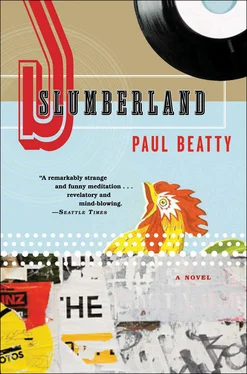Paul Beatty - Slumberland
Здесь есть возможность читать онлайн «Paul Beatty - Slumberland» весь текст электронной книги совершенно бесплатно (целиком полную версию без сокращений). В некоторых случаях можно слушать аудио, скачать через торрент в формате fb2 и присутствует краткое содержание. Год выпуска: 2009, Издательство: Bloomsbury USA, Жанр: Современная проза, на английском языке. Описание произведения, (предисловие) а так же отзывы посетителей доступны на портале библиотеки ЛибКат.
- Название:Slumberland
- Автор:
- Издательство:Bloomsbury USA
- Жанр:
- Год:2009
- ISBN:нет данных
- Рейтинг книги:4 / 5. Голосов: 1
-
Избранное:Добавить в избранное
- Отзывы:
-
Ваша оценка:
- 80
- 1
- 2
- 3
- 4
- 5
Slumberland: краткое содержание, описание и аннотация
Предлагаем к чтению аннотацию, описание, краткое содержание или предисловие (зависит от того, что написал сам автор книги «Slumberland»). Если вы не нашли необходимую информацию о книге — напишите в комментариях, мы постараемся отыскать её.
is laugh-out-loud funny and its wit and satire can be burning…There are incredible moments of tenderness…Beatty is a kind of symphonic W. E. B. Du Bois.”—
Ferocious, bombastic, and hilarious,
is vintage Paul Beatty and belongs on the shelf next to Jonathan Lethem, Colson Whitehead, and Junot Diaz. In this widely praised novel of race, identity, and underground music, DJ Darky has created the perfect beat. Now, he must seek out Charles Stone, a little known avant-garde jazzman, who can help bring his sonic masterpiece to fruition.
Slumberland — читать онлайн бесплатно полную книгу (весь текст) целиком
Ниже представлен текст книги, разбитый по страницам. Система сохранения места последней прочитанной страницы, позволяет с удобством читать онлайн бесплатно книгу «Slumberland», без необходимости каждый раз заново искать на чём Вы остановились. Поставьте закладку, и сможете в любой момент перейти на страницу, на которой закончили чтение.
Интервал:
Закладка:
I pressed record.
Lars pressed record.
I turned off my tape recorder and said, “Before we begin, I’d like to tell you that not everything I say to you will be the truth.”
He asked whether the jukebox had changed the bar’s notorious reputation as a meat market. I shrugged modestly, and Doris elbowed me in the side, forcing me to tell him the Carly Simon story.
The day after the new jukebox had been plugged in I stumbled upon a woman giving a guy head in the bathroom. Such Weimaresque displays of public affection, although common at raucous Berlin bars like the Kumpelnest and Café M, were unheard of at the race-mixing joints. For us Slumberlanders the sexual electricity was all about the pretense of taboo and stigma. If blacks and whites kissed in public it would take the fun out of the game. Sour the forbidden fruit gemütlichkeit, so to speak. Yet there they were, he leaning back against the sink, she squatting in front of him, her stringy blonde head plunging in and out of his nappy, ashen crotch, her hands grabbing onto the faucets for support, his hands wrapped around her neck for psychological and physical leverage. They were both crying and singing in tandem to Carly Simon’s “You’re So Vain,” the lachrymal ballad that dripped from the bathroom speaker. It was the most romantic and disgusting scene I’d ever witnessed. The scene played out like a page stricken from a long-lost Othello folio.
Act V, Scene I
OTHELLO
Lo, sweet Desdemona, many a knave and nobleman hath warned me, “Thou canst not maketh a ho into a housewife.” And yet, sainted wife, my dagger knows no other scabbard.
140
If they saw me, they continued to sing, and I continued to look and listen. He was in astonishingly good voice, a princely Ugandan alto with a hint of Jagger’s pseudo-cockney accent. She, on the other hand, was understandably garbled. I can still hear their orgiastic duet.
“Yeah,” I answered blithely, “the Slumberland’s the same, but different.”
We talked freely and openly for hours, the interview finally ending with Lars inquiring in that strange fractured syntax that most people adopt whenever discussing anything niggeresque, “How come they ain’t no hip-hop on the jukebox?”
“There isn’t?”
“No.”
“I guess it’s because rap doesn’t sound right in a bookstore, bar, coffee shop, or television commercial.”
“Less authentic?”
“It’s more about the acoustics. What makes hip-hop special is its spatial intimacy with the listener. Rap is a claustrophobic music that sounds best on headphones jammed deep into your ear canals, in a cinder block dorm room or a car packed dashboard to trunk with your friends, the music so loud that the rearview mirror pops to the beat, the weed bounces up and down on the Zig-Zag, the factory-installed bass speakers fight for their lives as the bass threatens to blow them and your eardrums out. You can’t play the music loud enough in here to give it any import. Maybe when hiphop dies, and it will die, then it’ll be fit for public consumption. Can you imagine listening to “Rebel Without a Pause” at low, unobtrusive Muzak volume, sipping a hot, cream-free double espresso and wondering, ‘Is this what Public Enemy meant by black power?’ ”
Lars turned off his tape recorder. As if on cue, the finger snaps to Peggy Lee’s “Fever” strutted into the bar, black-cat cool and followed by a finicky, purring vocal that slinked into your lap and demanded attention. On the other side of the bar a portly woman leaned over a dreadlocked American to put her drink order in to the bartender and her angora-covered breasts in his face. Her order placed, she tucked her hair behind her ear and started snapping her fingers to the beat. She wasn’t giving me fever, but the woman sitting next to the dread got hot and told her to step back.
Lars watched the scene curiously, drumming his pen on the bar, when he slowly turned his head in my direction and said, “Charles Stone”
I don’t how to punctuate that quote. There is no way to classify its purpose, for it was spoken without one. It came across more as an involuntary Tourette’s utterance than anything else. What could possess him to name-drop the Schwa, my paper-thin and increasingly futile raison d’être, for no apparent raison?
“Charles Stone”
This time the words hung in the air, swinging like a shop-keeper’s nominal shingle in an ominous Dickensian London breeze. Their only defining characteristic, other than the unaccented phonation, was the tone, a tone that had a tinge of the spy’s trench coat trepidation when broaching a potential contact with the opening fragment of a cryptic code phrase.
“Charles Stone”
I didn’t know the proper response. During D-Day, Allied soldiers crawled and cowered in the French hedgerows doing their best to avoid being victims of friendly fire by shouting, “Thunder!” at one another and anything else that moved. The only way friendlies such as the groundhogs, the clouds, and scared-shitless draftees wouldn’t be fired upon was to answer the “Thunder!” with a prompt “Flash!”—preferably spoken in a strong Texas dialect.
I was afraid to say anything. I looked to Doris for help, but she excused herself to fix a cola dispenser that had run out of CO 2. Maybe “Charles Stone” was the music critic’s “Halt! Who goes there?” We all have our dinner-party litmus tests. Standardized oral pop quizzes that we give to the moderately attractive person with the mouth stuffed with deviled eggs in order to find out if they’re worth spending the next half hour with, much less the rest of one’s life. My litmus test of compatibility is “Tom Cruise.” I hate people who hate Tom Cruise, cultural automatons who at the mention of his name reflexively bridle and say the diminutive thespian and Theta level Scientologist is “crazy” and “a terrible actor.” They hate him because he’s easy to hate. They think that despising Tom Cruise’s lack of personality and supposed lack of talent is somehow a blow against the bland American Anschluss of the rest of the planet. Tom Cruise may indeed be the Christopher Columbus of the twentieth century, sent off by the kings of Hollywood to prove the new world of International Box Office isn’t flat and to find a direct route into the Asian market, but the decline of everything isn’t his fault; he’s just a cinematic explorer and a damn fine actor. And hating him doesn’t make you seditious — it makes you complicit.
Maybe Lars Papenfuss was waiting for me to say the wrong thing so he could deem me unworthy of German recognition and the social-democratic largesse that came with it, then take me out back and shoot me.
“Charles Stone.”
That one had a period on it. A punctuation of suspicion put there because my eyebrows kept folding to crazy angles as I tried to hold a dumbfounded look on my face.
“Charles Stone.”
I ignored him. Focused my attention on the Dreadlock-American and the two women. He had them both entranced. Every caesura in his story followed by a sigh and an earnest, “See, I’m from the ghetto. .” He playfully slipped pretzels onto the ring fingers of both women and asked them for their hands in marriage. Answering with yesses that didn’t come off as face-tiously as originally intended, they laughed and kissed him on the cheek. I had something to do with that. A few years down the line when one, possibly both of these women are catching dread’s kids at the bottom of the slide and answering the “What was daddy like?” question, I’ll gaze nostalgically through the park fence at their happy, caramel-colored, schnitzel-eating kids and say to myself, “Me and Peggy Lee had something to do with that.”
Peggy Lee’s “Fever” subsided, and during the record change a tense silence filled the bar. The dread jump-started his conversation with the usually patented “See, I’m from the ghetto. .,” only this time he was silenced by both women. They leaned backward off their stools, ears cocked toward the main room. They wanted to hear what was coming on next. The panting hound dog leitmotif to George Clinton’s “Atomic Dog” bounced jauntily into the room, lifting me and at least half the other drunks out of our seats and onto the sand-covered floor. There we shape-shifted and transmogrified from one funkified pose to another. The funk and nothing but the funk running over us like a hot iron, flattening and steaming the Slumberland universe into a single wrinkle-free dimension. Pressed into the walls, our limbs raised and bent at odd, acute, and not-so-cute angles, we looked like dancing figures circumscribing an ancient Babylonian vase. An earthenware urn telling a story of modern antiquity, glazed and fire-hardened civil servants riding and shimmying what they thought was the downbeat, illegal aliens flying fancy free for the first time in their destitute lives, finally feeling like the African royalty they so often claim to be.
Читать дальшеИнтервал:
Закладка:
Похожие книги на «Slumberland»
Представляем Вашему вниманию похожие книги на «Slumberland» списком для выбора. Мы отобрали схожую по названию и смыслу литературу в надежде предоставить читателям больше вариантов отыскать новые, интересные, ещё непрочитанные произведения.
Обсуждение, отзывы о книге «Slumberland» и просто собственные мнения читателей. Оставьте ваши комментарии, напишите, что Вы думаете о произведении, его смысле или главных героях. Укажите что конкретно понравилось, а что нет, и почему Вы так считаете.












